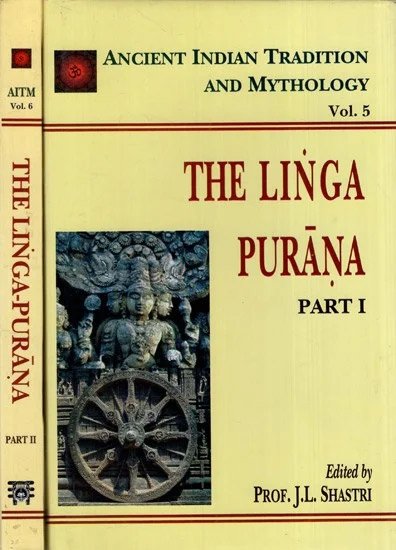The Linga Purana
by J. L. Shastri | 1951 | 265,005 words | ISBN-10: 812080340X | ISBN-13: 9788120803404
This page describes The description of a devotee of Vishnu which is chapter 4 of the English translation of the Linga Purana, traditionally authored by Vyasa in roughly 11,000 Sanskrit verses. It deals with Shaiva pilosophy, the Linga (symbol of Shiva), Cosmology, Yugas, Manvantaras, Creation theories, mythology, Astronomy, Yoga, Geography, Sacred pilgrimage guides (i.e., Tirthas) and Ethics. The Lingapurana is an important text in Shaivism but also contains stories on Vishnu and Brahma.
Chapter 4 - The description of a devotee of Viṣṇu
The sages said:—
1. O highly intelligent one, tell us, what are the characteristics of those persons who are devoted to Vāsudeva and who are called Vaiṣṇavas, devotees of Viṣṇu?
2. O Sūta, the most excellent one among those who know all topics, recount all this to us. What does the lord the conceiver and creator of living beings do unto them?
Sūta said:
3. Formerly, the sage Mārkaṇḍeya was asked by Ambarīṣa the same topic as has been mentioned by you now. I shall precisely recount the same to you.
Mārkaṇḍeya said:
4. O king, listen. What you ask me is pertinent. Nārāyaṇa is present there where the devotee of Viṣṇu stays.
5. Viṣṇu is remembered as their diety everywhere. When he is being eulogised, a Vaiṣṇava invariably feels an emotional thrill.
6-7. He who is delighted on seeing persons endowed with devotion of Viṣṇu, and those who perform rites laid down in Śrutis and Smṛtis is eulogised as a Vaiṣṇava. On seeing them his body shivers and perspires. Drops of tears are seen in his eyes. A Vaiṣṇava does not wear more clothes than what are needed for his body’s protection.
8. On seeing a devotee of Viṣṇu comṃg, the Vaiṣṇava, standing face to face, perforins obeisance as though towards Vasudeva himself.
9-10. He should be known as the devotee, he will be victorious in the three worlds who speaks with forbearance even on hearing harsh words. He who puts on scents, fragrant flowers etc. on his head thinking that every thing belongs to Viṣṇu is known as Vaiṣṇava.
11-13a. Endowed with affection he shall perform only auspicious rites in the holy centre of Viṣṇu. He shall worship the idol of Viṣṇu perpetually with a purified soul. He shall then be known as a devotee of Viṣṇu. Mentally, verbally and physically he is devoted to Nārāyaṇa for ever. Indeed, he is a great Bhāgavata devotee of the lord.
13b-14a. He who offers food and duly propitiates another devotee of Viṣṇu in accordance with his ability, is really a Vaiṣṇava.
14b-16a. If a scholar devoted to Viṣṇu accepts the food from anyone with a delighted mind, that food is undoubtedly one that goes into the ‘mouth of Viṣṇu. Viṣṇu the soul of the Universe, the favourite of his devotees, becomes more pleased than from his own worship, when he sees the same being done to his devotee.
16b-21. On seeing a Vaiṣṇava who is devoted to Viṣṇu and who has burned all his sins, even Devas become afraid. They bow ḍown to him before proceeding on their own ways. Listen to an ancient anecdote that demonstrates prowess of a devotee of Viṣṇu. On seeing the son of Bhṛgu who was a devotee and a Vaiṣṇava who had buried his sins, Yama stood up with palms joined in reverence and bowed to him. Hence, a man shall devoutly worship Vaiṣṇavas in the same manner as they worship Viṣṇu. He undoubtedly attains nearness to Viṣṇu. A devotee of Viṣṇu surpasses thousands of other devotees. A devotee of Rudra is far better than thousands of other devotees ofViṣṇu. There is certainly no one greater than the devotee of Rudra in this world. Hence, by all means one shall worship a Vaiṣṇava or a devotee of Rudra for achieving virtue, love, wealth and salvation.
